Garbagesortingandrecycling垃圾分类与回收
- 格式:ppt
- 大小:1.35 MB
- 文档页数:9
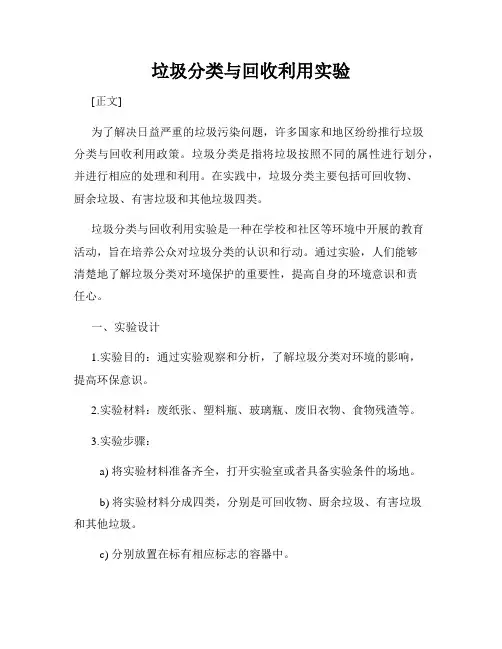
垃圾分类与回收利用实验[正文]为了解决日益严重的垃圾污染问题,许多国家和地区纷纷推行垃圾分类与回收利用政策。
垃圾分类是指将垃圾按照不同的属性进行划分,并进行相应的处理和利用。
在实践中,垃圾分类主要包括可回收物、厨余垃圾、有害垃圾和其他垃圾四类。
垃圾分类与回收利用实验是一种在学校和社区等环境中开展的教育活动,旨在培养公众对垃圾分类的认识和行动。
通过实验,人们能够清楚地了解垃圾分类对环境保护的重要性,提高自身的环境意识和责任心。
一、实验设计1.实验目的:通过实验观察和分析,了解垃圾分类对环境的影响,提高环保意识。
2.实验材料:废纸张、塑料瓶、玻璃瓶、废旧衣物、食物残渣等。
3.实验步骤:a) 将实验材料准备齐全,打开实验室或者具备实验条件的场地。
b) 将实验材料分成四类,分别是可回收物、厨余垃圾、有害垃圾和其他垃圾。
c) 分别放置在标有相应标志的容器中。
d) 记录实验开始时各类垃圾的数量和重量。
e) 进行一段时间的垃圾分类和回收利用操作,保持环境整洁。
f) 实验结束后再次记录各类垃圾的数量和重量。
二、实验结果与分析经过一段时间的实验操作,我们统计了实验开始和结束时各类垃圾的数量和重量。
根据数据,我们进行了如下分析:1.可回收物:根据实验结果,我们观察到可回收物的数量和重量明显减少,这说明通过回收利用,可回收物得到了有效处理,减少了资源的浪费。
2.厨余垃圾:实验开始和结束时厨余垃圾的数量和重量保持相对稳定。
这表明垃圾分类对于厨余垃圾的处理效果较好,有利于减少环境污染和改善居住环境。
3.有害垃圾:通过实验数据我们可以发现,有害垃圾的数量和重量相对较少。
这说明人们对有害垃圾的识别和处理能力有待提高,需要加强相关宣传和教育。
4.其他垃圾:实验前后其他垃圾的数量和重量没有明显的变化。
这可能是因为人们对其他垃圾的识别和分类较为困难,需要进一步加强特定垃圾的分类指导。
综上所述,垃圾分类与回收利用实验通过直观的数据和实际的操作,可以提高公众对垃圾分类的认知和行为。
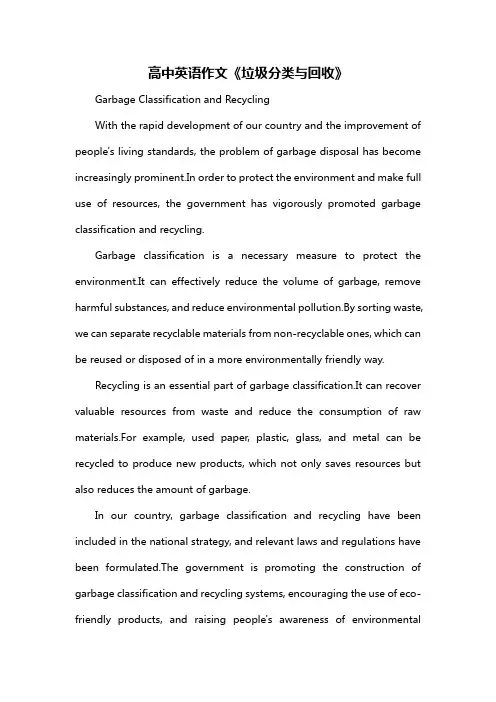
高中英语作文《垃圾分类与回收》Garbage Classification and RecyclingWith the rapid development of our country and the improvement of people's living standards, the problem of garbage disposal has become increasingly prominent.In order to protect the environment and make full use of resources, the government has vigorously promoted garbage classification and recycling.Garbage classification is a necessary measure to protect the environment.It can effectively reduce the volume of garbage, remove harmful substances, and reduce environmental pollution.By sorting waste, we can separate recyclable materials from non-recyclable ones, which can be reused or disposed of in a more environmentally friendly way.Recycling is an essential part of garbage classification.It can recover valuable resources from waste and reduce the consumption of raw materials.For example, used paper, plastic, glass, and metal can be recycled to produce new products, which not only saves resources but also reduces the amount of garbage.In our country, garbage classification and recycling have been included in the national strategy, and relevant laws and regulations have been formulated.The government is promoting the construction of garbage classification and recycling systems, encouraging the use of eco-friendly products, and raising people's awareness of environmentalprotection.As high school students, we should consciously practice garbage classification and recycling, and spread the knowledge of environmental protection to our families and society.Let's work together to build a beautiful China with a clean and green environment.。
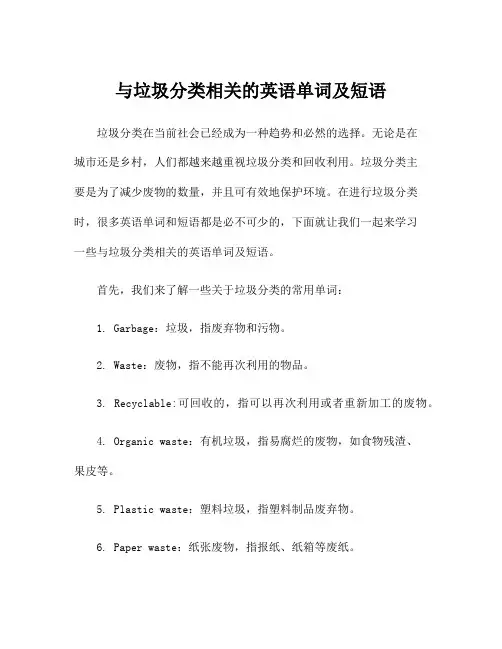
与垃圾分类相关的英语单词及短语垃圾分类在当前社会已经成为一种趋势和必然的选择。
无论是在城市还是乡村,人们都越来越重视垃圾分类和回收利用。
垃圾分类主要是为了减少废物的数量,并且可有效地保护环境。
在进行垃圾分类时,很多英语单词和短语都是必不可少的,下面就让我们一起来学习一些与垃圾分类相关的英语单词及短语。
首先,我们来了解一些关于垃圾分类的常用单词:1. Garbage:垃圾,指废弃物和污物。
2. Waste:废物,指不能再次利用的物品。
3. Recyclable:可回收的,指可以再次利用或者重新加工的废物。
4. Organic waste:有机垃圾,指易腐烂的废物,如食物残渣、果皮等。
5. Plastic waste:塑料垃圾,指塑料制品废弃物。
6. Paper waste:纸张废物,指报纸、纸箱等废纸。
7. Glass waste:玻璃废物,指玻璃制品废弃物。
8. Hazardous waste:危险废物,指对人类和环境有危害的废弃物。
9. Landfill:填埋场,指专门用于垃圾填埋的场地。
10. Composting:堆肥,指利用有机垃圾等进行自然分解产生有机肥料。
其次,我们来了解一些与垃圾分类相关的常用短语:1. Garbage sorting:垃圾分类,指将不同种类的垃圾进行分类。
2. Recycling program:回收项目,指用于收集和回收可再生资源的计划。
3. Waste segregation:废物分离,指将废物分开以便于回收利用。
4. Environmental protection:环境保护,指通过各种措施保护和改善自然环境。
5. Reduce, reuse, recycle:减少、重复利用、回收,指环保口号,号召人们减少废物、重复利用和回收利用资源。
6. Green living:绿色生活,指倡导环保、低碳、低能耗的生活方式。
7. Waste management:废物管理,指对废物进行有效的处理和利用。
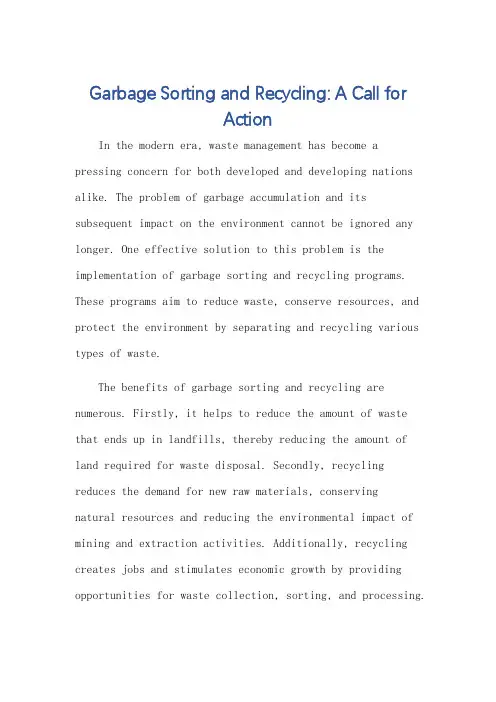
Garbage Sorting and Recycling: A Call forActionIn the modern era, waste management has become a pressing concern for both developed and developing nations alike. The problem of garbage accumulation and its subsequent impact on the environment cannot be ignored any longer. One effective solution to this problem is the implementation of garbage sorting and recycling programs. These programs aim to reduce waste, conserve resources, and protect the environment by separating and recycling various types of waste.The benefits of garbage sorting and recycling are numerous. Firstly, it helps to reduce the amount of waste that ends up in landfills, thereby reducing the amount of land required for waste disposal. Secondly, recycling reduces the demand for new raw materials, conservingnatural resources and reducing the environmental impact of mining and extraction activities. Additionally, recycling creates jobs and stimulates economic growth by providing opportunities for waste collection, sorting, and processing.To ensure the success of garbage sorting and recycling programs, it is crucial to involve the community at all levels. Education and awareness-raising campaigns are essential to inform people about the importance of garbage sorting and recycling, and to encourage them to participate actively in these programs. Governments and private sector organizations should collaborate to implement effective waste management policies and provide the necessary infrastructure and facilities for garbage sorting and recycling.Moreover, innovative technologies and approaches can be employed to enhance the efficiency of garbage sorting and recycling processes. For instance, the use of smart bins and sensors can automate the sorting process, reducing human error and increasing efficiency. Additionally, the development of new recycling technologies can improve the quality and quantity of recycled materials, making them more suitable for reuse in manufacturing processes.In conclusion, garbage sorting and recycling arecrucial for sustainable waste management and environmental protection. By involving the community, implementingeffective policies, and harnessing innovative technologies, we can turn waste into a valuable resource and contribute to a cleaner, greener, and more sustainable future for all. **垃圾回收分组:行动的呼唤**在现代社会,垃圾管理已成为发达国家和发展中国家共同面临的重要问题。
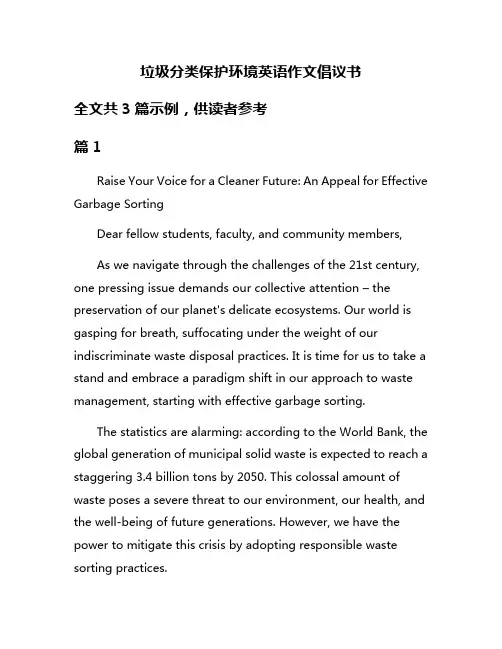
垃圾分类保护环境英语作文倡议书全文共3篇示例,供读者参考篇1Raise Your Voice for a Cleaner Future: An Appeal for Effective Garbage SortingDear fellow students, faculty, and community members,As we navigate through the challenges of the 21st century, one pressing issue demands our collective attention – the preservation of our planet's delicate ecosystems. Our world is gasping for breath, suffocating under the weight of our indiscriminate waste disposal practices. It is time for us to take a stand and embrace a paradigm shift in our approach to waste management, starting with effective garbage sorting.The statistics are alarming: according to the World Bank, the global generation of municipal solid waste is expected to reach a staggering 3.4 billion tons by 2050. This colossal amount of waste poses a severe threat to our environment, our health, and the well-being of future generations. However, we have the power to mitigate this crisis by adopting responsible waste sorting practices.Garbage sorting is not merely a buzzword; it is a revolutionary concept that holds the key to unlocking a sustainable future. By separating our waste into distinct categories, such as recyclables, organics, and non-recyclables, we can significantly reduce the strain on our landfills and incinerators. This simple act has far-reaching implications, from preserving natural resources to minimizing greenhouse gas emissions.Imagine a world where our recyclable materials are given a second life, transformed into new products instead of languishing in landfills. Envision thriving ecosystems, where biodegradable waste is composted and nourishes the soil, providing sustenance for countless organisms. Picture cleaner air and water, free from the toxic pollutants that plague our planet. This vision can become a reality through our collective commitment to garbage sorting.But why should we, as students, care about this issue? The answer is simple: we are the torchbearers of tomorrow. The decisions we make today will shape the world we inherit. By embracing garbage sorting, we can cultivate a culture of environmental stewardship that will resonate throughout our lives and inspire generations to come.Furthermore, our academic institutions play a pivotal role in shaping the minds of future leaders and decision-makers. By implementing comprehensive garbage sorting programs on campus, we can foster a sense of environmental responsibility and lead by example. Imagine the impact we could have if every classroom, dormitory, and cafeteria embraced this practice – a ripple effect that could inspire change far beyond our campus boundaries.However, our efforts should not be confined to our institutions alone. We must extend our reach into our communities, rallying support and encouraging households, businesses, and local governments to join us in this crucial endeavor. Together, we can create a groundswell of change, a movement that transcends boundaries and unites us in our shared mission to protect our planet.To those who may doubt the efficacy of garbage sorting, let us not forget the power of collective action. Every small step we take, every piece of waste we sort, contributes to a larger movement that can reshape our world. By embracing this practice, we not only reduce our environmental footprint but also set an example for others to follow.So, let us raise our voices in unison, echoing the call for a cleaner, more sustainable future. Let us embrace garbage sorting as a way of life, a testament to our commitment to preserving the planet for generations to come. Together, we can rewrite the narrative of waste management, leaving a lasting legacy of environmental stewardship.Join me, fellow students, in this crucial endeavor. Let us be the change we wish to see in the world, one sorted piece of waste at a time.Sincerely,[Your Name]A Passionate Student Advocate for Environmental Protection篇2Raise Your Voice to Protect Our Planet Through Proper Garbage SortingAs students, we have grown up learning about the importance of protecting the environment and combating the effects of climate change. However, simply being aware of these issues is not enough – we must take action to truly make a difference. One of the most impactful ways we can contribute toenvironmental conservation efforts is through proper garbage sorting and recycling practices.The statistics surrounding waste management are alarming. According to the Environmental Protection Agency (EPA), the average American generates approximately 4.9 pounds of trash per day, resulting in a staggering 292.4 million tons of municipal solid waste annually. Alarmingly, only about a third of this waste is recycled or composted, with the remaining two-thirds ending up in landfills or incinerators, both of which have detrimental impacts on the environment.Landfills are a major contributor to greenhouse gas emissions, releasing methane – a potent greenhouse gas – as organic materials decompose. Additionally, they can contaminate groundwater and soil with toxic leachate, posing threats to human health and ecosystems. Incineration, while reducing the volume of waste, releases pollutants such as nitrogen oxides, sulfur dioxide, and particulate matter into the air, contributing to air pollution and respiratory health issues.Proper garbage sorting and recycling can significantly mitigate these environmental hazards. By separating recyclable materials like paper, plastic, glass, and metal from the rest of our waste, we can divert these resources from landfills andincinerators, conserving natural resources and reducing the demand for raw materials. The recycling process itself also requires less energy and generates fewer emissions compared to extracting and processing virgin materials.Moreover, composting organic waste, such as food scraps and yard trimmings, can reduce the amount of methane released from landfills while creating nutrient-rich soil amendments for gardens and agricultural applications. This not only reduces greenhouse gas emissions but also supports sustainable food production and soil health.As students, we have a unique opportunity to lead by example and inspire our communities to adopt more environmentally conscious practices. We can start by implementing effective garbage sorting and recycling programs within our schools, dormitories, and campuses. By making it convenient and accessible for students to properly dispose of their waste, we can cultivate a culture of environmental stewardship from an early age.Furthermore, we can use our voices to advocate for better waste management policies and infrastructure at the local and national levels. By collaborating with environmental organizations, local governments, and community leaders, wecan push for improved recycling facilities, composting programs, and public education campaigns that promote sustainable waste practices.It is also crucial that we educate ourselves and our peers on the significance of proper garbage sorting and its far-reaching impacts. We can organize awareness campaigns, seminars, and workshops to share information and encourage our fellow students to adopt eco-friendly habits. By fostering a sense of collective responsibility, we can create a ripple effect that extends beyond our campuses and into our communities.In addition to our efforts within the academic setting, we can also take personal actions to reduce our individual waste footprints. This can include carrying reusable bags, water bottles, and containers to minimize the use of single-use plastics, as well as consciously purchasing products with minimal packaging or choosing items made from recycled materials.By embracing these practices, we not only contribute to a cleaner and healthier environment but also set an example for future generations. Our actions today will shape the world we leave behind for our children and grandchildren.It is important to acknowledge that implementing effective waste management strategies requires collaboration andcooperation from various stakeholders, including governments, businesses, and individuals. However, as students, we possess a unique power to ignite change and inspire others to take action.Let us raise our voices and demand a future where our planet is protected, and our resources are conserved. By embracing proper garbage sorting and recycling, we can pave the way for a more sustainable and resilient world. It is our responsibility, as the leaders of tomorrow, to ensure that our actions today contribute to a brighter and greener future for all.篇3Calling All Students: The Time to Protect Our Planet is Now!My fellow classmates, I come to you today with an urgent message about the fate of our planet. As young people, the future rests squarely on our shoulders, and it is our responsibility to take action now to preserve the world we will soon inherit. The issue at hand is the growing crisis of waste mismanagement and its devastating impact on the environment.We live in a world of convenience, where single-use plastics and disposable items have become the norm. From the plastic water bottles we sip from to the takeout containers we bring home, our daily lives are inundated with waste. And while thisconvenience may seem harmless, the truth is that our casual attitude towards waste is slowly suffocating our planet.Every year, millions of tons of plastic waste end up in our oceans, choking marine life and polluting the very waters that sustain us. Landfills are overflowing, and our once-pristine landscapes are marred by the ugly sight of litter. But it doesn't have to be this way. We have the power to change the course of this disaster, and it starts with a simple act: proper waste sorting.Imagine if every student on this campus took the time to separate their waste into the appropriate bins – plastics, paper, glass, and compostable materials. It may seem like a small gesture, but when multiplied by the thousands of students here, the impact would be monumental. By diverting waste from landfills and ensuring that materials are properly recycled or composted, we can drastically reduce our carbon footprint and give our planet a fighting chance.But waste sorting is just the beginning. We must also commit to reducing our consumption of single-use plastics and embracing a more sustainable lifestyle. Bring reusable water bottles and lunch containers to school. Say no to plastic straws and utensils. Opt for products with minimal packaging or better yet, choose package-free alternatives.I understand that breaking old habits can be challenging, but the alternative is far too grim to ignore. If we continue down this path of wasteful living, we risk inheriting a planet that is barely habitable – a world plagued by rising sea levels, extreme weather events, and dwindling natural resources.But there is hope. By joining forces and making conscious choices, we can turn the tide on this environmental crisis. Imagine a campus where recycling bins overflow with carefully sorted materials, where composting is the norm, and where single-use plastics are a thing of the past. It may sound like a dream, but it is a reality we can achieve if we work together.So, I implore you, my fellow students, to join me in this fight for our planet's future. Let us lead by example and inspire those around us to embrace sustainable living. Start sorting your waste today, and commit to reducing your plastic consumption. Educate your friends and family about the importance of responsible waste management. Attend campus events and join environmental clubs to amplify your impact.Remember, we are the future leaders and decision-makers of tomorrow. The choices we make today will shape the world we inherit. Let us choose a world where our children andgrandchildren can breathe clean air, swim in pristine oceans, and marvel at the beauty of untouched landscapes.The time to act is now. Our planet is calling out for help, and it is up to us to answer the call. Together, we can create a greener, more sustainable future for generations to come.Embrace the power of waste sorting, my fellow students. Protect our planet, one sorted item at a time.。
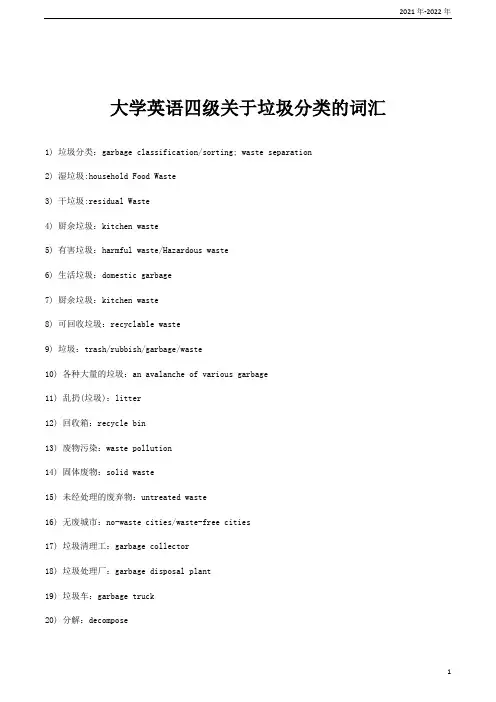
大学英语四级关于垃圾分类的词汇1) 垃圾分类:garbage classification/sorting; waste separation2) 湿垃圾:household Food Waste3) 干垃圾:residual Waste4) 厨余垃圾:kitchen waste5) 有害垃圾:harmful waste/Hazardous waste6) 生活垃圾:domestic garbage7) 厨余垃圾:kitchen waste8) 可回收垃圾:recyclable waste9) 垃圾:trash/rubbish/garbage/waste10) 各种大量的垃圾:an avalanche of various garbage11) 乱扔(垃圾):litter12) 回收箱:recycle bin13) 废物污染:waste pollution14) 固体废物:solid waste15) 未经处理的废弃物:untreated waste16) 无废城市:no-waste cities/waste-free cities17) 垃圾清理工:garbage collector18) 垃圾处理厂:garbage disposal plant19) 垃圾车:garbage truck20) 分解:decompose21) 堆肥:compost22) 一次性餐具:disposable cutlery23) 变废为宝:turn waste into treasure24) 果汁盒子:juice box25) 吸管果汁盒:juice box with straw26) 牛奶盒:milk carton27) 电池:battery28) 报纸:newspaper29) 水瓶:water bottle30) 瓶盖:bottle tops31) 流行的瓶子:pop bottle32) 杯和吸管:cup with straw33) 罐头:cans34) 纸袋:paper bag。
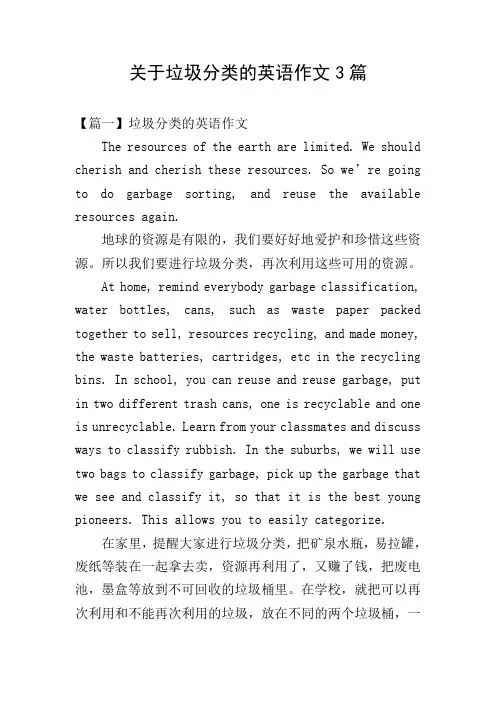
关于垃圾分类的英语作文3篇【篇一】垃圾分类的英语作文The resources of the earth are limited. We should cherish and cherish these resources. So we’re going to do garbage sorting, and reuse the available resources again.地球的资源是有限的,我们要好好地爱护和珍惜这些资源。
所以我们要进行垃圾分类,再次利用这些可用的资源。
At home, remind everybody garbage classification, water bottles, cans, such as waste paper packed together to sell, resources recycling, and made money, the waste batteries, cartridges, etc in the recycling bins. In school, you can reuse and reuse garbage, put in two different trash cans, one is recyclable and one is unrecyclable. Learn from your classmates and discuss ways to classify rubbish. In the suburbs, we will use two bags to classify garbage, pick up the garbage that we see and classify it, so that it is the best young pioneers. This allows you to easily categorize.在家里,提醒大家进行垃圾分类,把矿泉水瓶,易拉罐,废纸等装在一起拿去卖,资源再利用了,又赚了钱,把废电池,墨盒等放到不可回收的垃圾桶里。
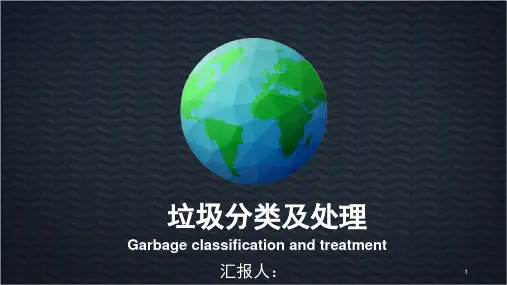
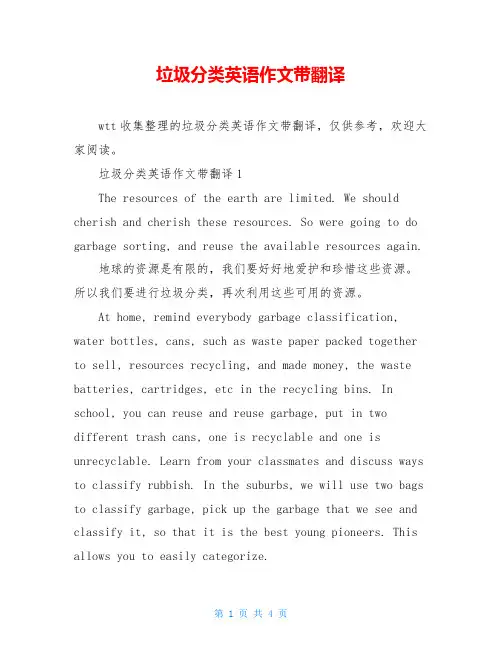
垃圾分类英语作文带翻译wtt收集整理的垃圾分类英语作文带翻译,仅供参考,欢迎大家阅读。
垃圾分类英语作文带翻译1The resources of the earth are limited. We should cherish and cherish these resources. So were going to do garbage sorting, and reuse the available resources again.地球的资源是有限的,我们要好好地爱护和珍惜这些资源。
所以我们要进行垃圾分类,再次利用这些可用的资源。
At home, remind everybody garbage classification, water bottles, cans, such as waste paper packed together to sell, resources recycling, and made money, the waste batteries, cartridges, etc in the recycling bins. In school, you can reuse and reuse garbage, put in two different trash cans, one is recyclable and one is unrecyclable. Learn from your classmates and discuss ways to classify rubbish. In the suburbs, we will use two bags to classify garbage, pick up the garbage that we see and classify it, so that it is the best young pioneers. This allows you to easily categorize.在家里,提醒大家进行垃圾分类,把矿泉水瓶,易拉罐,废纸等装在一起拿去卖,资源再利用了,又赚了钱,把废电池,墨盒等放到不可回收的垃圾桶里。
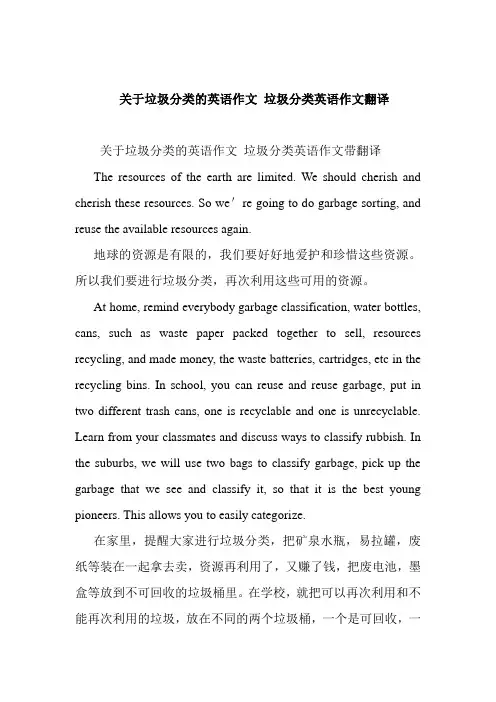
关于垃圾分类的英语作文垃圾分类英语作文翻译关于垃圾分类的英语作文垃圾分类英语作文带翻译The resources of the earth are limited. We should cherish and cherish these resources. So we're going to do garbage sorting, and reuse the available resources again.地球的资源是有限的,我们要好好地爱护和珍惜这些资源。
所以我们要进行垃圾分类,再次利用这些可用的资源。
At home, remind everybody garbage classification, water bottles, cans, such as waste paper packed together to sell, resources recycling, and made money, the waste batteries, cartridges, etc in the recycling bins. In school, you can reuse and reuse garbage, put in two different trash cans, one is recyclable and one is unrecyclable. Learn from your classmates and discuss ways to classify rubbish. In the suburbs, we will use two bags to classify garbage, pick up the garbage that we see and classify it, so that it is the best young pioneers. This allows you to easily categorize.在家里,提醒大家进行垃圾分类,把矿泉水瓶,易拉罐,废纸等装在一起拿去卖,资源再利用了,又赚了钱,把废电池,墨盒等放到不可回收的垃圾桶里。
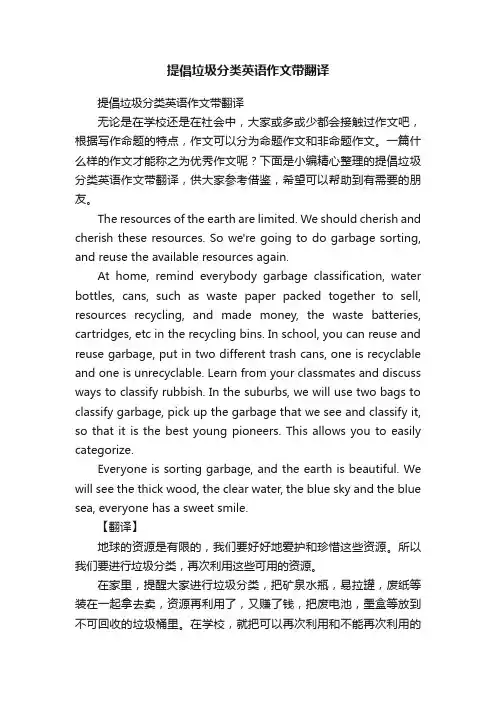
提倡垃圾分类英语作文带翻译提倡垃圾分类英语作文带翻译无论是在学校还是在社会中,大家或多或少都会接触过作文吧,根据写作命题的特点,作文可以分为命题作文和非命题作文。
一篇什么样的作文才能称之为优秀作文呢?下面是小编精心整理的提倡垃圾分类英语作文带翻译,供大家参考借鉴,希望可以帮助到有需要的朋友。
The resources of the earth are limited. We should cherish and cherish these resources. So we're going to do garbage sorting, and reuse the available resources again.At home, remind everybody garbage classification, water bottles, cans, such as waste paper packed together to sell, resources recycling, and made money, the waste batteries, cartridges, etc in the recycling bins. In school, you can reuse and reuse garbage, put in two different trash cans, one is recyclable and one is unrecyclable. Learn from your classmates and discuss ways to classify rubbish. In the suburbs, we will use two bags to classify garbage, pick up the garbage that we see and classify it, so that it is the best young pioneers. This allows you to easily categorize.Everyone is sorting garbage, and the earth is beautiful. We will see the thick wood, the clear water, the blue sky and the blue sea, everyone has a sweet smile.【翻译】地球的资源是有限的,我们要好好地爱护和珍惜这些资源。
与垃圾分类相关的英语单词及短语垃圾分类在世界各地变得越来越重要,因为人们意识到对环境做出积极的贡献的重要性。
垃圾分类可以帮助减少废弃物对环境造成的损害,促进可持续发展。
在进行垃圾分类时,一些相关的英语单词和短语是非常有用的。
1.垃圾分类相关的英语单词:- Garbage/recycling/composting:垃圾/可回收垃圾/堆肥- Waste separation:垃圾分类- Recycling center:回收中心- Landfill:垃圾填埋场- Organic waste:有机垃圾- Hazardous waste:危险废物- Plastic recycling:塑料回收- Metal recycling:金属回收- Paper recycling:纸张回收- Glass recycling:玻璃回收- Compost:堆肥- Waste management:垃圾处理- Environmental impact:环境影响- Sustainable development:可持续发展2.垃圾分类相关的英语短语:- Sort and separate the waste:分类和分离垃圾- Dispose of the waste properly:正确处理垃圾- Reduce, reuse, recycle:减少,重复利用,回收- Dispose of hazardous waste separately:单独处理危险废物- Dispose of organic waste in a compost bin:在堆肥桶中处理有机垃圾- Take the recyclables to a recycling center:把可回收物带到回收中心- Minimize environmental impact:最小化环境影响- Promote sustainable living:促进可持续生活方式- Raise awareness about waste management:提高垃圾处理意识- Implement waste reduction strategies:实施垃圾减量策略垃圾分类对环境有着重要的影响,通过适当的垃圾分类可以减少对环境的污染,并且可以节省资源。
垃圾分类英语作文关于垃圾分类英语作文(通用11篇)无论在学习、工作或是生活中,大家都尝试过写作文吧,作文要求篇章结构完整,一定要避免无结尾作文的出现。
你知道作文怎样才能写的好吗?下面是小编精心整理的关于垃圾分类英语作文,欢迎阅读与收藏。
The resources of the earth are limited. We should cherish and cherish these resources. So were going to do garbage sorting, and reuse the available resources again.地球的资源是有限的,我们要好好地爱护和珍惜这些资源。
所以我们要进行垃圾分类,再次利用这些可用的资源。
At home, remind everybody garbage classification, water bottles, cans, such as waste paper packed together to sell, resources recycling, and made money, the waste batteries, cartridges, etc in the recycling bins. In school, you can reuse and reuse garbage, put in two different trash cans, one is recyclable and one is unrecyclable. Learn from your classmates and discuss ways to classify rubbish. In the suburbs, we will use two bags to classify garbage, pick up the garbage that we see and classify it, so that it is the best young pioneers. This allowsyou to easily categorize.在家里,提醒大家进行垃圾分类,把矿泉水瓶,易拉罐,废纸等装在一起拿去卖,资源再利用了,又赚了钱,把废电池,墨盒等放到不可回收的垃圾桶里。
倡议垃圾分类英语作文英文回答:Garbage Sorting: A Proposal for a Greener Future.Garbage sorting, often referred to as waste segregation, is a crucial practice that involves separating different types of waste materials for proper disposal and recycling. By implementing a comprehensive garbage sorting system, we can significantly reduce the amount of waste that ends upin landfills and incineration facilities, conserve natural resources, and create a cleaner and healthier environmentfor both present and future generations.The benefits of garbage sorting are multifaceted. First and foremost, it helps reduce the volume of waste sent to landfills and incineration plants. Landfills are major sources of methane, a potent greenhouse gas thatcontributes to global warming. Incineration, while reducing landfill space, also releases harmful pollutants into theatmosphere. By separating recyclable materials and organic waste, we can divert a substantial amount of waste from these harmful disposal methods.Furthermore, garbage sorting promotes recycling and the recovery of valuable materials. Recyclable materials such as paper, plastic, glass, and metal can be transformed into new products, reducing the need for raw material extraction and conserving natural resources. The recovery of organic waste, such as food scraps and yard waste, through composting or anaerobic digestion can produce nutrient-rich soil amendments or renewable energy sources.Apart from the environmental benefits, garbage sorting also brings economic advantages. By reducing the amount of waste disposed of in landfills and incineration facilities, municipalities can save money on waste management costs. Additionally, the recycling industry creates jobs and stimulates economic growth. The reuse and reprocessing of materials not only reduces the demand for raw materials but also creates opportunities for innovation and sustainable business practices.The implementation of a successful garbage sorting system requires a multi-faceted approach. First, it is essential to raise awareness among the public about the importance of garbage sorting and to provide clear guidelines on how to separate different waste materials. This can be achieved through educational campaigns, community outreach programs, and the distribution of informational materials.Secondly, it is crucial to establish a convenient and accessible waste collection system that allows residents to easily dispose of their sorted waste. This may involve providing different colored bins or bags for different waste categories, setting up designated recycling drop-off points, and offering curbside collection services.Thirdly, it is important to ensure that the collected waste is properly processed and disposed of. This may involve investing in recycling facilities, composting plants, and waste-to-energy facilities. It is alsoessential to monitor and evaluate the effectiveness of thegarbage sorting system and make adjustments as needed.By taking action to implement comprehensive garbage sorting programs, we can make a significant contribution to a more sustainable and environmentally friendly future. By diverting waste from landfills and incineration plants, conserving natural resources, reducing greenhouse gas emissions, and creating economic opportunities, garbage sorting is an investment in the well-being of both our planet and its inhabitants.中文回答:垃圾分类,倡议构建绿色未来。
对垃圾分类的观点和态度英语作文As an increasing issue in modern society, garbage classification has become a hot topic that has been widely discussed and promoted. Different people hold different attitudes towards this issue, and some even have conflicting views on the topic.From my perspective, I believe that garbage classification is essential and necessary for a sustainable environment and a better future. The growing population and rapid industrialization have led to a massive increase in waste production, which has posed a severe threat to our environment. By sorting and recycling garbage, we can reduce the amount of waste that ends up in landfills or incinerators, thus minimizing pollution and promoting resource conservation.Furthermore, garbage classification can also raise public awareness of environmental protection and encourage people to adopt eco-friendly behaviors in their daily lives. Through the practice of garbage sorting, people can develop a habit of reducing, reusing, and recycling, which can significantly contribute to the preservation of our planet.However, there are also some people who oppose garbage classification for various reasons. Some argue that it istime-consuming and inconvenient to sort garbage into different categories, while others believe that the government should take more responsibility in waste management instead of burdening citizens with the task.Despite these arguments, I still firmly support garbage classification and believe that with proper education and infrastructure, it can be effectively implemented and benefit both the environment and society as a whole.In conclusion, garbage classification is a crucial step towards building a sustainable and environmentally friendly society. It is our responsibility to protect our planet and ensure that future generations can enjoy a clean and healthy environment. By promoting garbage classification and raising awareness of its importance, we can work together to create a better world for ourselves and our children.。
对垃圾分类的认识英文作文全国大学生英语竞赛The resources of the earth are limited. We should cherish and cherish these resources. So we're going to do garbage sorting, and reuse the available resources again.地球的资源是有限的,我们要好好地爱护和珍惜这些资源。
所以我们要进行垃圾分类,再次利用这些可用的资源。
At home, remind everybody garbage classification, water bottles, cans, such as waste paper packed together to sell, resources recycling, and made money, the waste batteries, cartridges, etc in the recycling bins. In school, you can reuse and reuse garbage, put in two different trash cans, one is recyclable and one is unrecyclable. Learn from your classmates and discuss ways to classify rubbish. In the suburbs, we will use two bags to classify garbage, pick up the garbage that we see and classify it, so that it is the best young pioneers. This allows you to easily categorize.在家里,提醒大家进行垃圾分类,把矿泉水瓶,易拉罐,废纸等装在一起拿去卖,资源再利用了,又赚了钱,把废电池,墨盒等放到不可回收的垃圾桶里。
垃圾分类作文【相关词汇】垃圾:trash/rubbish/garbage/waste各种大量的垃圾:a large amount of various garbage垃圾分类:garbage classification/sorting; waste separation乱扔(垃圾):litter生活垃圾:domestic garbage可回收垃圾:recyclable waste回收箱:recycle bin有害垃圾:harmful waste厨余垃圾:kitchen waste固体废物:solid waste未经处理的废弃物:untreated waste废物污染:waste pollution无废城市:no-waste cities/waste-free cities【讯息积累】北京市人大常委会表示,北京市将推动学校、医院等公共机构以及商业办公楼宇、旅游景区、酒店等经营性场所垃圾强制分类逐步全覆盖。
Beijing will introduce mandatory garbage classification rules at schools, hospitals, office buildings, tourist attractions and hotels, according to the Standing Committee of Beijing Municipal People's Congress, the local legislature.【重要讲话】实行垃圾分类,关系广大人民群众生活环境,关系节约使用资源,也是社会文明水平的一个重要体现。
——2019年6月3日习近平对垃圾分类工作作出重要指示Garbage classification is related to the people's living environment and the economical use of resources. It is also an important embodiment of the level of civic-mindedness.目前,每个城市每天都产生大量垃圾,垃圾分类刻不容缓。